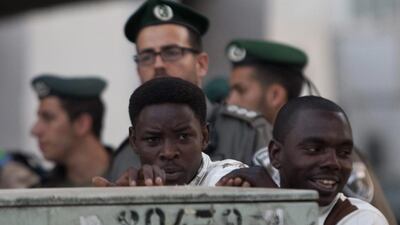The southern reaches of Tel Aviv lack the polished veneer of the city’s northern suburbs. Unkept winding streets all meander to the central bus station, a towering behemoth of 1970s brutalist chic. Inside the cavernous, six-floor bus station, one can seemingly find anything from seedy drug dealers to a Yiddish-language library, a stubborn reminder of a once-thriving language that the early Zionists sought to replace with Hebrew.
The central bus station is filled with an unlikely mix of uniformed soldiers using public transport to reach their military outposts, wide-eyed tourists and undercover immigration officers. This is not the place that Israel brands as a non-stop liberal party city on the Mediterranean. Above all else, the defining characteristics of south Tel Aviv are refugees, guest workers and asylum seekers from Africa and Asia.
In these neglected areas of Tel Aviv, the global debate about refugees and asylum seekers comes to life in a harsh light. Not since the end of the Second World War has human migration occupied such a central position in the global conversation about borders, security and demographics. From Syrian refugees risking everything for sanctuary in Europe to Donald Trump’s push to build a wall between the United States and Mexico, human migration is unavoidable and on the rise. Strangely, Israel’s often violent relationship with refugees is a lesson in the potential pitfalls of an extremist stance on immigration policy.
This saga is captured in an exhaustive new book by journalist Mya Guarnieri Jaradat titled The Unchosen: The Lives of Israel’s New Others. Having lived in Israel and Palestine for close to a decade, Jaradat was one of the first foreign journalists to investigate the issue of non-Jewish refugees in Israel for a wide range of publications, including this newspaper.
What she uncovered through years of on-the-ground reporting was an eerie blueprint for how western countries are now approaching their own immigration crisis while ignoring liberal values of openness and inclusion.
Israel grants automatic citizenship to any Jewish person, but in the case of non-Jews, it is extraordinarily rigid. This exclusivist policy was partially born when roughly 750,000 Palestinians were forced out of their homes in what would become Israel during the 1948 war. These refugees and their descendants remain barred from returning to their homes in historic Palestine.
From early statehood, Israel enacted laws designed to keep foreign non-Jews from becoming citizens, or at least made the process extremely difficult. This is all the more unique, as Jaradat notes, because Israeli officials helped draft the 1951 United Nations refugee convention that defined who is a refugee and outlined the responsibilities of nations granting asylum.
After Israel’s takeover of the West Bank and Gaza Strip in 1967, all types of manual labour were carried out by Palestinians. During the Second Intifada, Israel revoked thousands of work permits and began building a wall to keep day labourers out of the country. Not only did the closure wreak havoc on the Palestinian economy, it also left Israel in need of cheap labour, which it found in the form of guest labourers from South Asia, the Philippines and Thailand. In a system reminiscent of the labour programmes in the Gulf, Israel began importing labour not just for construction but also other low-paying jobs, including caregiving.
Jaradat chronicles the lives of some of the caregivers as they negotiate a rigid set of restrictions Israel placed on their employment visas. Caregivers, in particular, are beholden to their visa sponsor, and forced out of the country if they become pregnant. Many have had children while in Israel and this has given way to a network of unlicensed nurseries around Tel Aviv that care for children illegally while the parents work.
Israel’s treatment of guest workers is one long thread in Jaradat’s chronicle but it is the country’s position on asylum seekers that is deeply jarring. Over the last decade, thousands of Eritrean and Sudanese asylum seekers have reached the Israeli border in the Sinai after harrowing overland journeys. Unable to simply turn them back, Israel has essentially incarcerated asylum seekers in vast desert prisons.
A new and expensive wall along Israel’s southern border with Egypt has succeeded in curtailing large numbers of refugees from reaching Israel, however there are still an estimated 40,000 who remain in the country in a difficult limbo: they cannot work legally, but they also cannot apply for asylum.
There is something deeply uneven about this story. Israel, a country nominally founded to protect Jewish refugees fleeing the violence of Nazi Europe, now forcefully turns its back on Africans in desperate need of safety. Right-wing politicians such as Likud MP Miri Regev even compared African refugees to a “cancer” in Israeli society.
With the executive order banning Syrian refugees indefinitely from the United States and Donald Trump’s plan to build a wall on the Mexican border, one can see Israel’s aggressive stance against refugees take root in the minds of right-wing leaders in the West.
For those protesting or concerned about Mr Trump’s immigration policies, Jaradat’s account of Israel’s “new others” should be required reading. In Israel, asylum seekers fleeing violence and war are thought of as a cancer and jailed without trial. That dangerous mentality is now turning into policy in the West.
jdana@thenational.ae
On Twitter: @ibnezra

